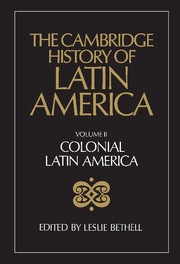Book contents
- Frontmatter
- PART ONE POPULATION
- PART TWO ECONOMIC AND SOCIAL STRUCTURES: SPANISH AMERICA
- 3 The urban development of colonial Spanish America
- 4 Mining in colonial Spanish America
- 5 The formation and economic structure of the hacienda in New Spain
- 6 The rural economy and society of colonial Spanish South America
- 7 Aspects of the internal economy of colonial Spanish America: labour; taxation; distribution and exchange
- 8 Social organization and social change in colonial Spanish America
- 9 Women in Spanish American colonial society
- 10 Africans in Spanish American colonial society
- 11 Indian societies under Spanish rule
- PART THREE ECONOMIC AND SOCIAL STRUCTURES: BRAZIL
- PART FOUR INTELLECTUAL AND CULTURAL LIFE
- Bibliographical essays
- References
10 - Africans in Spanish American colonial society
from PART TWO - ECONOMIC AND SOCIAL STRUCTURES: SPANISH AMERICA
Published online by Cambridge University Press: 28 March 2008
- Frontmatter
- PART ONE POPULATION
- PART TWO ECONOMIC AND SOCIAL STRUCTURES: SPANISH AMERICA
- 3 The urban development of colonial Spanish America
- 4 Mining in colonial Spanish America
- 5 The formation and economic structure of the hacienda in New Spain
- 6 The rural economy and society of colonial Spanish South America
- 7 Aspects of the internal economy of colonial Spanish America: labour; taxation; distribution and exchange
- 8 Social organization and social change in colonial Spanish America
- 9 Women in Spanish American colonial society
- 10 Africans in Spanish American colonial society
- 11 Indian societies under Spanish rule
- PART THREE ECONOMIC AND SOCIAL STRUCTURES: BRAZIL
- PART FOUR INTELLECTUAL AND CULTURAL LIFE
- Bibliographical essays
- References
Summary
Africans accompanied, as slaves, the earliest voyages and expeditions to the New World. Until the last quarter of the sixteenth century, however, with a numerous if already declining native American population to exploit, the demand for African slave labour in Spanish America was modest, except to some extent in the Caribbean islands and the tropical coasts of the mainland, from which Indians virtually vanished in the early stages of colonization. For the period from 1521 to 1550 the most reliable estimate, that of Philip D. Curtin, puts the total number of blacks shipped to Spanish America at 15,000 (an annual average of 500), and for the years 1551–95, the figure rose only to 36,300 (an annual average of 810). It would be an overstatement to term the African slave a luxury item during this period – slaves can be found in gold panning and in plantation agriculture (mainly sugar) as well as in domestic service – but the distribution of blacks was relatively generalized, and no particular region was as yet dependent on slavery as a labour institution. However, as the Indian population in the main centres of the Spanish empire, Mexico and Peru, declined rapidly towards the end of the sixteenth century an increasing volume of petitions to the crown from colonists and government officials urged a supply of additional manpower, and the obvious source was Africa.
- Type
- Chapter
- Information
- The Cambridge History of Latin America , pp. 357 - 380Publisher: Cambridge University PressPrint publication year: 1984
References
- 2
- Cited by



